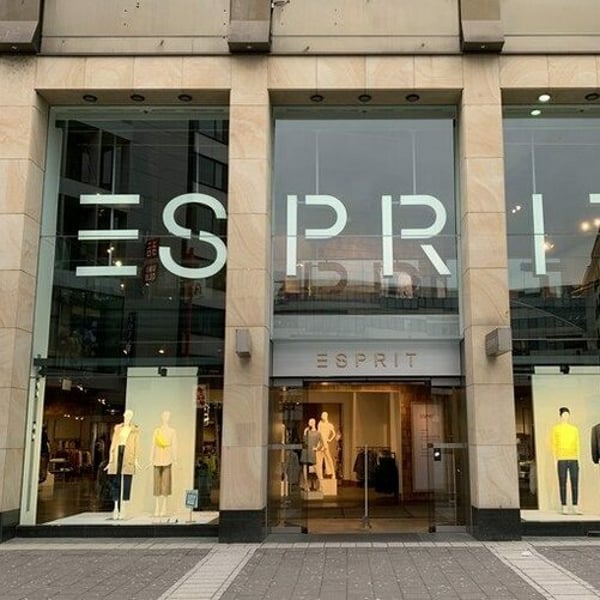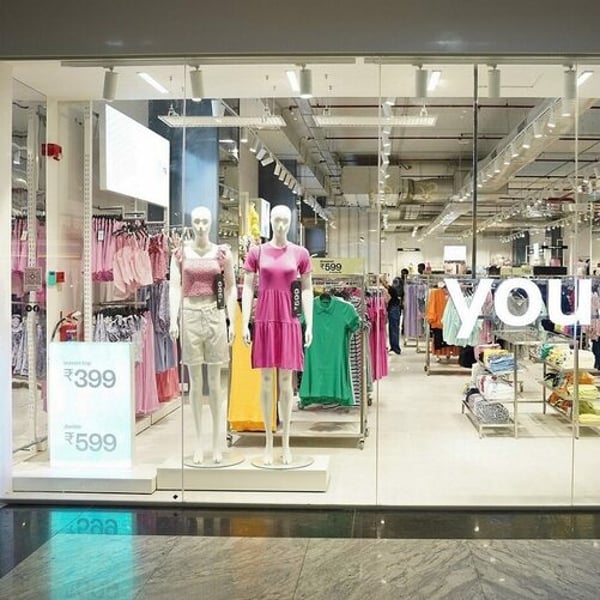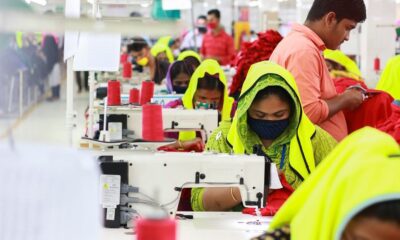Fashion
Esprit reports 75% sales drop, shifts focus to licensing

Translated by
Nazia BIBI KEENOO
Published
August 29, 2025
Esprit is now operating primarily as a licensor. Still, management hopes its licensing business will begin generating stronger revenue going forward. Without that growth, the insolvent holding company—under which the brand’s wholesale and e-commerce operations in Europe, Hong Kong, and North America are grouped—may continue to struggle.
In the first six months of 2025, Esprit reported sales from continuing operations of approximately HKD 6.59 million (about €724,000), down 75% from HKD 26.1 million during the same period in 2024.
The decline is mainly attributed to the loss of license income from European trademark rights, which were derecognized in 2024 following insolvency proceedings for the group’s German subsidiaries. The company posted a net loss of HKD 20.8 million, compared to a profit of HKD 9.1 million in the same period last year.
Discontinued operations, however, resulted in a profit of HKD 22.1 million for the period, which contributed to a modest net profit of HKD 1.3 million attributable to shareholders. As of June 30, the holding company employed just 38 people, down from over 500 the year prior.
Despite these setbacks, management intends to continue operations and is shifting its focus toward an “asset-light,” license-driven brand strategy. The model aims to reduce the significant costs tied to procurement, distribution, and retail operations.
This article is an automatic translation.
Click here to read the original article.
Copyright © 2025 FashionNetwork.com All rights reserved.
Fashion
Valentino Garavani dies aged 93

Published
January 19, 2026
Valentino Garavani, an icon of Italian fashion, founder of his eponymous maison, and widely regarded as one of the greatest designers of all time, died in Rome on January 19, surrounded by his loved ones.
Born in Voghera, Italy on May 11, 1932, he showed remarkable artistic talent from an early age, which led him to study drawing and fashion in Paris, where he worked with couturiers such as Jean Dessès and Guy Laroche.
Upon returning to Italy, he opened his first atelier on Via Condotti in Rome in 1960, supported by his business partner, Giancarlo Giammetti. International success soon followed: his debut show at Florence’s Palazzo Pitti in 1962 marked his breakthrough, establishing him as an undisputed standard-bearer of Italian fashion worldwide. In 1968, the famous “V” logo was introduced, later becoming the emblem of the maison. Equally iconic is his signature red, inspired by a gown he saw at the opera in his youth, which made this shade a defining hallmark of the house.
Valentino Garavani announced his retirement in 2007, at the age of 75, with a final show celebrating his extraordinary career. His legacy is also chronicled in the 2008 documentary directed by Matt Tyrnauer: “Valentino: The Last Emperor.”
Garavani’s lying in state will be held at PM23, Piazza Mignanelli 23 in Rome, on Wednesday and Thursday, January 21 and 22, 2026, from 11:00 to 18:00. The funeral will take place on Friday, January 23, 2026, at 11:00, at the Basilica of Santa Maria degli Angeli e dei Martiri, Piazza della Repubblica 8, Rome.
This article is an automatic translation.
Click here to read the original article.
Copyright © 2026 FashionNetwork.com All rights reserved.
Fashion
EU Council prez to convene extraordinary meeting to discuss Greenland

Trump last week announced he would impose a new round of higher tariffs on several EU members starting February 1 as the latter did not support US demand to buy Greenland from Denmark.
EU diplomats have agreed to accelerate efforts to dissuade President Donald Trump from imposing tariffs on European allies, while preparing retaliatory measures.
European Council President Antonio Costa consulted members on the Greenland issue and said he would convene an extraordinary meeting of the Council in the coming days.
The bloc is committed to defend itself against any form of coercion, he said.
“NATO has been telling Denmark, for 20 years, that ‘you have to get the Russian threat away from Greenland’,” he wrote on Truth Social. “Unfortunately, Denmark has been unable to do anything about it. Now it is time, and it will be done!!!”
European Council President Antonio Costa consulted member states on the latest tensions over Greenland and issued a statement saying such tariffs would undermine trans-Atlantic relations and are incompatible with the EU-US trade agreement. He reconfirmed the bloc’s strong commitment to defend it against any form of coercion.
Expressing the bloc’s readiness to continue engaging constructively with the United States on all issues of common interest, he said he would convene an extraordinary meeting of the Council in the coming days.
“Europe will not be blackmailed,” Danish Prime Minister Mette Frederiksen said in a statement.
An option being reportedly considered is a package of tariffs on €93 billion worth of US imports that could automatically take effect on February 6 following the expiry of a six-month pause.
Another involves deploying the Anti-Coercion Instrument (ACI), a never-used tool that could restrict access to public tenders, investments or banking activity and limit trade in services, including digital services, where the United States runs a surplus with the bloc.
After speaking to NATO Secretary General Mark Rutte, French President Emmanuel Macron, British Prime Minister Keir Starmer, German Chancellor Friedrich Merz and Italian Prime Minister Giorgia Meloni, European Commission chief Ursula von der Leyen asserted EU commitment to upholding the sovereignty of Greenland and Denmark and posted on X: “We will always protect our strategic economic and security interests”.
“We will face these challenges to our European solidarity with steadiness and resolve,” she said.
“No intimidation or threat will influence us—whether in Ukraine, in Greenland or elsewhere in the world,” Macron wrote on X. “Tariff threats are unacceptable and have no place in this context. Europeans will respond in a united and coordinated manner if they are confirmed,” he wrote.
“We will not allow ourselves to be blackmailed,” said Swedish Prime Minister Ulf Kristersson.
Fibre2Fashion (DS)
Fashion
Reliance misses third-quarter profit estimates at $2.06 billion for the October-December quarter

By
Reuters
Published
January 19, 2026
On Friday, India’s Reliance Industries posted an 186.45 billion rupees ($2.06 billion) profit for the October-December quarter, missing analysts’ average estimate of 196.44 billion rupees, according to data compiled by LSEG.
Shares of Reliance Industries fell as much as 2.7% in early trade on Monday after the conglomerate announced missing its third-quarter profit estimates, weighed down by slowing earnings growth in its retail segment. Shares of the Mukesh Ambani-led firm were trading at 1,426. 60 rupees, as of 9:41 am, and were among the top five losers on the benchmark Nifty 50 Index
UBS analysts trimmed Oil-to-Chemicals(O2C) and retail estimates slightly but said they still see room for a valuation re-rating, as the company’s earnings before interest and taxes (EBIT) mix increasingly shifts toward structural growth drivers such as digital and retail, reducing dependence on the cyclical oil and gas segment. Festive discounting, investment in hyper-local delivery startups, and a one-off impact from India’s new labour code trimmed core margins at its retail unit to 8% from 8.6% a year earlier.
Retail growth softened primarily because the festive season was brought forward and due to the one-month impact of the consumer products demerger, analysts at Emkay said. Core earnings for the segment grew 1.3% to 69.15 billion rupees, compared with 9.5% growth a year earlier.
Reliance’s oil and gas segment weakened due to lower output and softer price realisations from its ageing KG-D6 fields, leading to an 8.4% revenue decline and a 12.7% drop in core earnings amid higher maintenance costs. Meanwhile, analysts at Systematix forecast a rise of 5%, 12%, and 9% O2C, Retail, and Jio revenue CAGR, respectively, during FY25-FY28, while a 12% decline in their oil and gas businesses.
© Thomson Reuters 2026 All rights reserved.
-

 Tech7 days ago
Tech7 days agoNew Proposed Legislation Would Let Self-Driving Cars Operate in New York State
-

 Sports1 week ago
Sports1 week agoClock is ticking for Frank at Spurs, with dwindling evidence he deserves extra time
-

 Entertainment6 days ago
Entertainment6 days agoX (formerly Twitter) recovers after brief global outage affects thousands
-

 Fashion1 week ago
Fashion1 week agoSouth India cotton yarn gains but market unease over US tariff fears
-

 Fashion1 week ago
Fashion1 week agoChina’s central bank conducts $157-bn outright reverse repo operation
-

 Sports1 week ago
Sports1 week agoUS figure skating power couple makes history with record breaking seventh national championship
-

 Sports4 days ago
Sports4 days agoPak-Australia T20 series tickets sale to begin tomorrow – SUCH TV
-

 Entertainment1 week ago
Entertainment1 week agoFive killed in road accident in Khyber

















